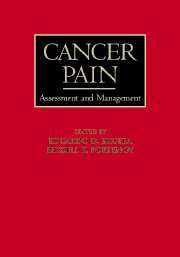Book contents
- Frontmatter
- Contents
- List of contributors
- Preface
- SECTION I MECHANISMS AND EPIDEMIOLOGY
- SECTION II ASSESSMENT AND SYNDROMES
- SECTION III PHARMACOLOGICAL TREATMENT
- SECTION IV NONPHARMACOLOGICAL APPROACHES
- SECTION V THE ROLE OF ANTINEOPLASTIC THERAPIES IN PAIN CONTROL
- SECTION VI PAIN IN SPECIAL POPULATIONS
- SECTION VII DIFFICULT PAIN PROBLEMS
- SECTION VIII SPECIAL TOPICS
- 25 Pain in medical illness: ethical foundations
- 26 Understanding clinical trials in pain research
- 27 Legal and regulatory aspects of opioid treatment: the United States experience
- 28 Role of family caregivers in cancer pain management
- Index
26 - Understanding clinical trials in pain research
from SECTION VIII - SPECIAL TOPICS
Published online by Cambridge University Press: 08 October 2009
- Frontmatter
- Contents
- List of contributors
- Preface
- SECTION I MECHANISMS AND EPIDEMIOLOGY
- SECTION II ASSESSMENT AND SYNDROMES
- SECTION III PHARMACOLOGICAL TREATMENT
- SECTION IV NONPHARMACOLOGICAL APPROACHES
- SECTION V THE ROLE OF ANTINEOPLASTIC THERAPIES IN PAIN CONTROL
- SECTION VI PAIN IN SPECIAL POPULATIONS
- SECTION VII DIFFICULT PAIN PROBLEMS
- SECTION VIII SPECIAL TOPICS
- 25 Pain in medical illness: ethical foundations
- 26 Understanding clinical trials in pain research
- 27 Legal and regulatory aspects of opioid treatment: the United States experience
- 28 Role of family caregivers in cancer pain management
- Index
Summary
Introduction
The randomized, controlled trial (RCT) is a modern innovation; the first RCT—the British Medical Research Council's trial of streptomycin for pulmonary tuberculosis—was published in 1948 (1,2). Despite this brief history, the RCT now represents the “gold standard” for evaluating the efficacy of new medical interventions and new applications for existing interventions. Unfortunately, the marked increase in the use of RCTs during the past 50 years (3) has not been accompanied by corresponding advances in overcoming the method's several limitations. Indeed, several potential scientific and ethical difficulties continue to limit the use of RCTs in some clinical contexts and hinder the interpretation of their results in others.
In this chapter, we first discuss the various strengths and limitations common to all RCTs, making special reference to trials of pain management interventions when appropriate. We describe the structure of an RCT, consider how several decisions regarding trial design can influence the trial's results, discuss basic issues in the analysis of trial data, and attempt to guide readers in interpreting a trial's results. Because no research experiment can ever be perfect, we hope this chapter will provide clinicians with sufficient understanding of the proper structure of, and inherent problems with, RCTs to be able to ascertain whether the results of published trials are 1) likely to be valid and 2) likely to apply to their patients.
Anatomy of a trial
Designing and conducting an RCT requires investigators to carefully consider several design issues. The decisions investigators make regarding each component of an RCT can dramatically influence the outcome of the trial.
- Type
- Chapter
- Information
- Cancer PainAssessment and Management, pp. 444 - 455Publisher: Cambridge University PressPrint publication year: 2003



